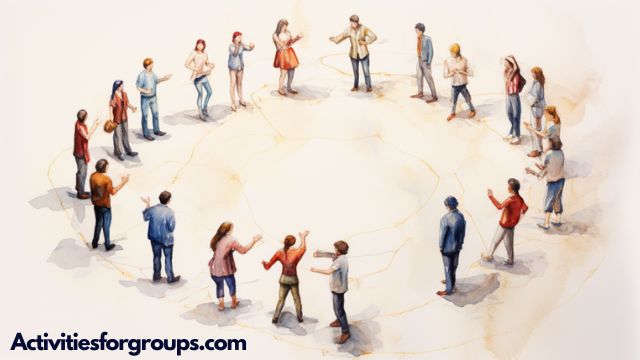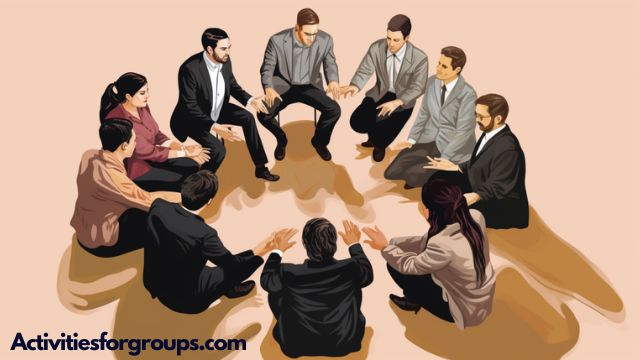You’ve seen the power of group activities in action, whether it’s at school, work, or even in your own home. Group activities can be a great way to bring people together and foster collaboration.

But did you know that group activities can also be used as an effective tool for developing leadership skills? From team building exercises to hands-on projects, there are a number of ways to use group activities to build your leadership abilities.
In this article, we’ll discuss the many benefits of group activities and explore different types of group activities that can help you hone your leadership skills. Ready to learn more? Let’s get started!
Group Activities Ideas For Developing Leadership Skills
| Activity Idea | Benefits for Developing Leadership Skills |
|---|---|
| Team Sports | – Encourages teamwork and collaboration – Teaches how to motivate others and set common goals – Develops strategic thinking and adaptability |
| Role-playing Scenarios | – Improves problem-solving skills – Enhances communication and negotiation abilities – Fosters empathy and understanding of different perspectives |
| Group Projects | – Cultivates project management and delegation – Promotes accountability and responsibility – Sharpens decision-making through collective input |
| Debate Club | – Strengthens persuasive speaking and active listening – Boosts critical thinking and the ability to constructively handle dissent – Encourages open-mindedness and the consideration of multiple viewpoints |
| Volunteer Work | – Builds empathy and social awareness – Enhances organizational and planning skills – Provides experience in leading diverse groups and community engagement |
| Outdoor Adventure Programs | – Tests leadership under pressure – Improves risk assessment and crisis management – Encourages resilience and perseverance through challenges |
| Business Simulation Games | – Provides hands-on experience with strategic planning and resource allocation – Teaches financial literacy and market understanding – Fosters innovation and entrepreneurial thinking |
| Peer Mentoring | – Develops coaching and personal development skills – Encourages active listening and feedback provision – Strengthens interpersonal relationships and trust-building |
| Leadership Workshops | – Provides theoretical knowledge and practical leadership frameworks – Encourages self-reflection and personal leadership style development – Facilitates networking and learning from experienced leaders |
| Community Service Projects | – Enhances awareness of societal issues and the impact of leadership – Develops organizational and logistical skills – Provides experience in leading social change initiatives |
| Task Forces on Real Issues | – Offers real-world problem-solving experience – Teaches how to build consensus and drive action – Encourages innovation and creative thinking |
| Cultural Exchange Programs | – Promotes cultural awareness and sensitivity – Enhances communication skills across diverse groups – Provides a global perspective on leadership and collaboration |
| Case Study Analysis | – Develops analytical and strategic thinking – Encourages application of theoretical knowledge to practical situations – Teaches how to synthesize information and make informed decisions |
| Board Games and Puzzles | – Improves tactical planning and foresight – Encourages teamwork and cooperative problem-solving – Teaches how to deal with uncertainty and changing dynamics |
Benefits of Group Activities
You can benefit from group activities by developing important leadership skills! Group activities are great for networking events, as they provide an opportunity to connect with a variety of people. They also offer a chance to practice role-playing in different scenarios and take on various roles within the group. This helps build confidence in one’s abilities.
Group activities allow for collaboration between members of the group, which gives each person a chance to work together with others and learn how to delegate tasks effectively. This practice can help individuals become better at problem-solving and decision-making, both essential skills for any leader. It also teaches participants how to communicate more clearly and efficiently, which is an important part of leading any team or organization.
Group activities also encourage creative thinking and provide a platform for brainstorming new ideas. This encourages individuals to think outside the box and come up with solutions that may not have been considered before. Additionally, it allows team members to develop trust among each other, as well as respect for individual opinions and ideas.
In addition to these benefits, group activities allow people to challenge themselves while having fun at the same time. As participants try new things in a safe environment, they get comfortable taking risks, which can be beneficial when it comes time for them to lead their own teams or organizations in the future. All these factors create an ideal setting for honing leadership skills that will prove invaluable later on down the line.
Different Types of Group Activities
You may have heard of group activities like team sports, brainstorming sessions, or problem-solving exercises. These are all great ways to get a group together and work towards a common goal–whether that’s improving communication skills or developing leadership qualities.
Team sports can foster teamwork and cooperation while brainstorming sessions allow for creative solutions and problem-solving exercises encourage critical thinking.
All these activities provide wonderful opportunities for individuals to learn from each other and grow as a team.
Team sports
Playing team sports can give you a chance to hone your leadership skills. From trust building to honing communication skills, playing as part of a team can help foster important qualities that translate into successful leadership.
In fact, developing collaborative trust and understanding between teammates is often the foundation for strong leadership. Team sports also require players to take initiative and make decisions on their own when necessary, giving them invaluable opportunities to practice problem-solving in real-time.
Team sports also teach players how to support each other while working towards a common goal. This helps participants develop patience, respect for others’ opinions, and confidence in their decision-making abilities—all qualities of an effective leader.
Moreover, engaging with opponents in sport competitions encourages participants to learn from their mistakes and use them as teaching moments for further growth and development.
Brainstorming sessions
Brainstorming sessions provide an invaluable opportunity to collaborate, think creatively, and come up with innovative ideas.
Through open-ended questions and debate topics, you can encourage decision making among members of the group. These activities also allow for creative problem-solving and risk-taking; important skills for developing leadership capabilities.
In addition, by fostering a team environment in which everyone is encouraged to express their opinion and contribute ideas, brainstorming sessions help develop strong communication skills that are essential for effective leadership.
Furthermore, these activities can help build trust within the group while helping individuals learn how to take initiative without fear of failure or criticism.
Problem-solving exercises
Problem-solving exercises help teams find solutions to complex challenges quickly and effectively, enabling them to move forward confidently. Working together in a group setting helps develop important communication skills, such as active listening, speaking clearly and respectfully, and understanding each other’s perspectives.
It also teaches time management by helping the team set goals and prioritize tasks efficiently. By utilizing these problem-solving activities, leaders learn how to collaborate with others while developing their own leadership abilities. They can make decisions collaboratively, delegate tasks based on individual strengths, and discover innovative solutions through creative thinking.
Additionally, these exercises emphasize the importance of feedback and valuing diverse opinions as part of the process.
How to Use Group Activities to Develop Leadership Skills?

Developing leadership skills through group activities can be an effective way to build community, increase engagement, and grow team spirit.
Setting goals, delegating tasks, and encouraging creativity are all important elements of successful group activities that can help individuals hone their leadership skills.
By taking the time to plan out a well-rounded group activity, you’ll be able to provide your team with the opportunity to practice valuable leadership skills in a safe and supportive environment.
Setting goals
Setting clear goals can help leaders develop the skills necessary to become successful. To achieve this, it is important to create objectives that help build trust within the group and foster collaboration. A great way to do this is by setting up a three-column and five-row table with actionable goals for each member of the team.
Within each row, list out tasks that are specific and measurable so that each member has an understanding of their individual responsibilities. Additionally, set deadlines for each task so that there is a sense of urgency in completing the job on time.
By doing this, team leaders can ensure everyone works together towards one common goal while simultaneously developing their own leadership skills.
Delegating tasks
Delegating tasks is key to getting the job done efficiently and successfully. When leading a group activity, it’s important to trust team members enough to assign tasks within their capabilities, while also providing guidance if needed. Doing so requires strong communication skills and can help build trust between team members.
Here are three ways effective delegation can develop leadership skills:
-
Learning how to set expectations for each task
-
Listening carefully when receiving feedback from teammates
-
Being able to adjust plans based on input from others
Encouraging creativity
| By delegating tasks, leaders can create a space for inspiring innovation and cooperative collaboration. Encouraging creativity is an important part of leadership, as it allows group members to explore new ideas together. | ||
|---|---|---|
| Brainstorming | Role play | Debate |
| Storytelling | Simulations | Outdoor activities |
| Collaborative art projects | Problem solving activities | Games |
Conclusion
Group activities can be a great way to develop leadership skills. By participating in different types of activities, you can learn how to work together with others, build relationships, and take control when necessary.
With practice and dedication, you’ll soon find yourself becoming more confident and better equipped to lead. So don’t hesitate – get involved in group activities today!




Leave a Reply